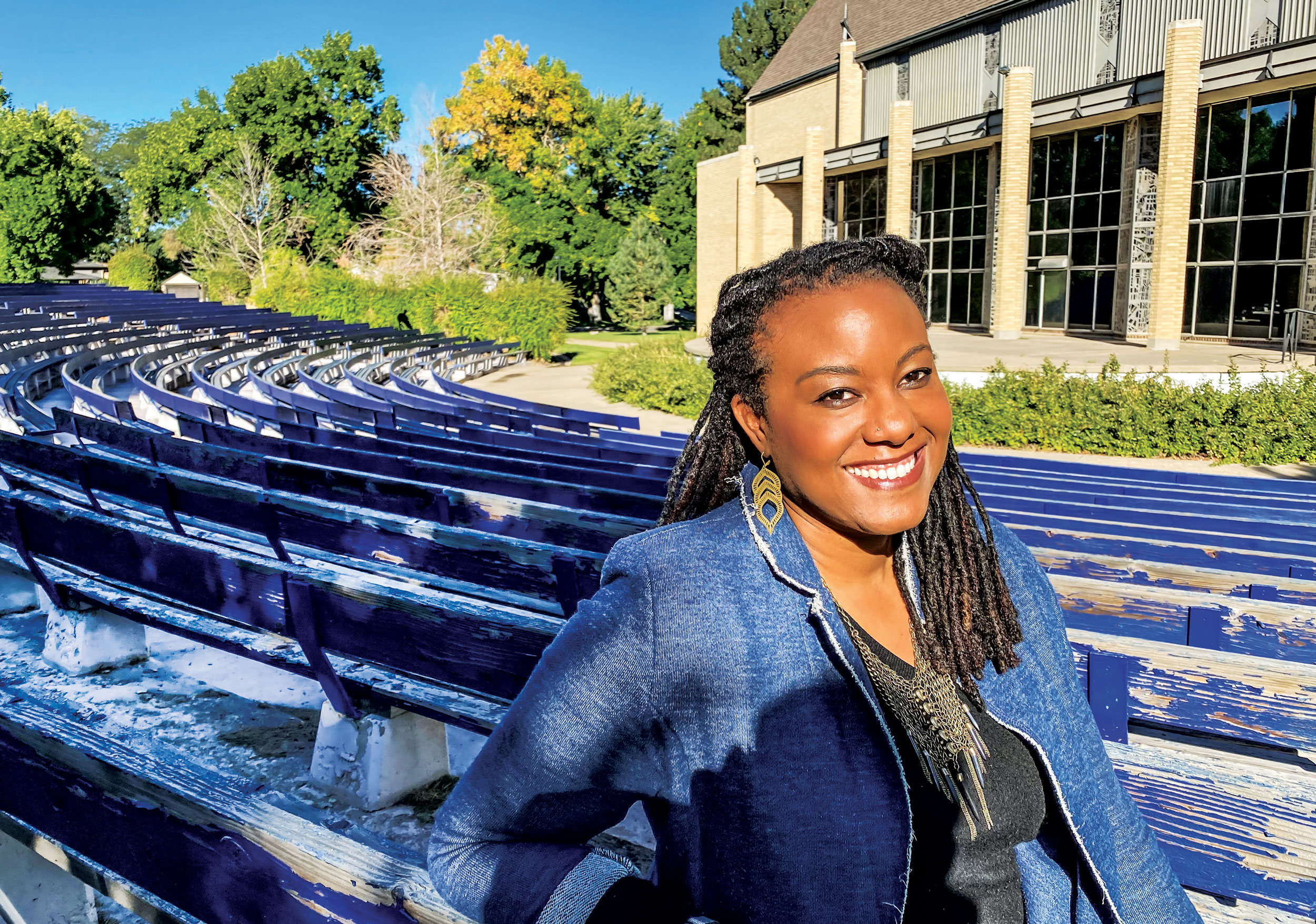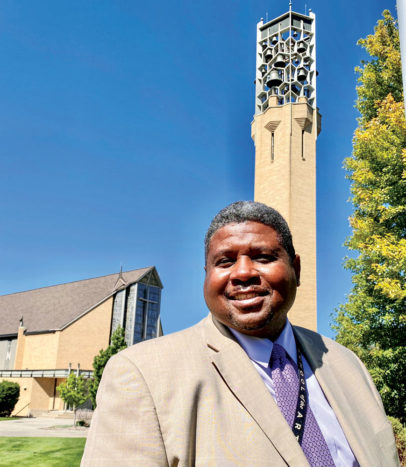
The Urban Land Conservancy’s Erin Clark sits on a bench at the amphitheater where she used to play as a child.
![]()
Thanks to the vision and persistence of leaders at Denver Public Schools and the Urban Land Conservancy, the redevelopment of the former Johnson and Wales complex in East Park Hill will uphold and broaden the historical mission of the campus, while ensuring that it becomes more diverse and inclusive.

Anthony McWright, principal of the Denver School of the Arts, initiated the innovative partnership that is transforming the former Johnson and Wales campus.
The innovative land-use agreement between public and non-profit organizations began when Anthony McWright, principal of the Denver School of the Arts (DSA), heard the news that Johnson and Wales was going to close its Denver campus. He instantly saw a “gift-wrapped opportunity” to help him realize his dream of expanding DSA so that any student who wanted to pursue an arts education could do so. After many meetings with DPS officials, he approached the Urban Land Conservancy to help figure out how to make it work financially. The two entities eventually brought in additional partners that specialized in housing, education, and entrepreneurship, including the Denver Housing Authority, Archway Communities, St. Elizabeth’s School, and the Kitchen Network. Remarkably, these public and non-profit entities were able to quickly put together a purchase proposal that won out over commercial developers.
That kind of collaboration was also a dream come true for Erin Clark, vice president of master site development at the Urban Land Conservancy. She has spent her 20-year career working to create accessible and affordable communities—and she didn’t want to see the Johnson and Wales campus get bulldozed to make way for more high-end condominiums. “We want to preserve affordable real estate in perpetuity. That’s core to our mission,” Clark says.
The Park Hill campus redevelopment is also very personal for Clark. She grew up at 18th and Newport and watched her mother get her law degree on that campus, which at the time housed the University of Denver Law School and the Colorado Women’s College. After attending Smiley Middle School and East High School, Clark received her undergraduate degree at Brown University, a master’s degree in urban planning from the University of Southern California, and a law degree from the University of Wisconsin.
Now, three years after joining the Urban Land Conservancy in Denver, Clark says she’s immensely proud to be involved in preserving the beautiful 112-year old Park Hill campus—and expanding its mission by making it accessible to more people. “This has always been a place for housing and education, but we’re expanding these services to different users,” says Clark. She points out that with an expanded DSA and St Elizabeth’s School, there will be K-12 education instead of higher education. Instead of college students occupying dorms, there will be affordable housing for seniors and families. And instead of a 4-year culinary college, the Kitchen Network will train chefs and food truck vendors who couldn’t afford a college degree. “It’s not a jarring change, but it’s an important change that is expanding access to groups that haven’t been able to be on the campus in the past.”
For McWright, the campus redevelopment will allow DSA to potentially double in size with more diversity, equity, and inclusion. He knows personally the power that arts education can have. He grew up in a small rural town in Mississippi in a family of modest means. “I found my way through the trombone, which paved the way for me to go to college. If I hadn’t picked up that trombone, I don’t know where I’d be today.” He wants to ensure that more students of color feel welcomed at the school. “We’ve done surveys which show that most black and brown families aren’t aware of what we offer,” says McWright. “We’re trying to remedy that by doing more outreach, going out to elementary schools to tell students what we have.”
McWright is hoping the expansion of DSA might also allow the school to expand its programming—perhaps even adding classes in culinary arts, broadcast journalism, and podcasting. He has been holding meetings with staff and district officials to ensure that DSA’s four newly-acquired buildings will be renovated in such a way that they will meet the needs of the school well into the future.
One of the things that excites both Clark and McWright is the potential for so many community partners to utilize the campus spaces in new ways. Clark says she and her colleagues are professional gap-fillers. “We’re trying to do things that aren’t being done—or we try to do them in new ways. And it’s all about leveraging partnerships.”
McWright notes the gorgeous outdoor amphitheater and wonders about creating a Shakespeare in the Park experience, or advancing existing partnerships with the Denver Center for Performing Arts, the Colorado Symphony, and many other arts groups. “This is going to be a great opportunity for the entire metro area,” says McWright. “We are eager to talk to community leaders to figure out how can we line up all these different entities so that it doesn’t take away from one area but enhances us overall?”
Over the coming months, the Urban Land Conservancy will hold public meetings to gather input from community members about what amenities they would like to see on the campus. One of the first orders of business? Generating ideas for a new name for the campus.
Front Porch photos by Steve Larson



Dr. Anthony McWright is a forward thinking, imaginative trail blazer, and great leader. He’s heart and soul is in the success of this project. We are blessed to have him head up this amazing opportunity for DSA, the Parkhill community, and Denver. This partnership is a game changer. Bravo!
Great creative use of space instead of defaulting to condo development. Thanks to both groups and Erin in particular for this excellent vision.